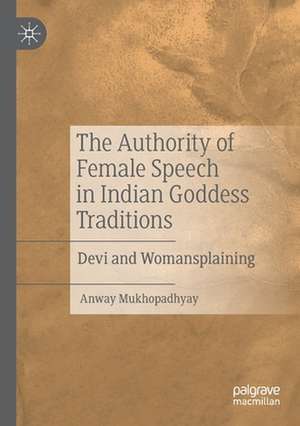The Authority of Female Speech in Indian Goddess Traditions: Devi and Womansplaining
Autor Anway Mukhopadhyayen Limba Engleză Paperback – 28 aug 2021
| Toate formatele și edițiile | Preț | Express |
|---|---|---|
| Paperback (1) | 633.53 lei 6-8 săpt. | |
| Springer International Publishing – 28 aug 2021 | 633.53 lei 6-8 săpt. | |
| Hardback (1) | 638.76 lei 6-8 săpt. | |
| Springer International Publishing – 28 aug 2020 | 638.76 lei 6-8 săpt. |
Preț: 633.53 lei
Preț vechi: 745.32 lei
-15% Nou
Puncte Express: 950
Preț estimativ în valută:
121.23€ • 125.26$ • 100.85£
121.23€ • 125.26$ • 100.85£
Carte tipărită la comandă
Livrare economică 19 martie-02 aprilie
Preluare comenzi: 021 569.72.76
Specificații
ISBN-13: 9783030524579
ISBN-10: 3030524574
Pagini: 171
Ilustrații: XI, 171 p.
Dimensiuni: 148 x 210 mm
Greutate: 0.23 kg
Ediția:1st ed. 2020
Editura: Springer International Publishing
Colecția Palgrave Macmillan
Locul publicării:Cham, Switzerland
ISBN-10: 3030524574
Pagini: 171
Ilustrații: XI, 171 p.
Dimensiuni: 148 x 210 mm
Greutate: 0.23 kg
Ediția:1st ed. 2020
Editura: Springer International Publishing
Colecția Palgrave Macmillan
Locul publicării:Cham, Switzerland
Cuprins
Chapter 1: Introduction: What the Goddess Said: What Her Speech Means to Us Today.- Chapter 2: Authoritative Female Speech and Indic Goddess Traditions: An Overview.- Chapter 3: Divine and Divine-Human Speeches of the Devi: The Speech Contexts and the Dynamics of Authority in the Devi Gitas.- Chapter 4: The Authority of Female Speech in Tantric Contexts.- Chapter 5: Two “Devis”, Two “ Gurus” Speaking with Authority: Sarada Devi and Anandamayi Ma.- Chapter 6: Modifying Masculinity: Tantric Culture, Female Speech and Reframed Masculinities.- Chapter 7 (Concluding Chapter): The Beauty of Womansplaining: The Authoritative Speech of Devi in India, in the World.
Recenzii
“The author writes in a lucid and yet sophisticated style and while the book is a must-read for scholars of Religious Studies (especially Hindu Studies) and Gender Studies, it will also benefit students/scholars of Women Studies, Comparative Religion and Postcolonial Studies. I would further insist that the book can be enjoyed even by ‘lay’ readers since it is a repository of beautiful mythological stories.” (Madhurima Nayak, Journal of Dharma Studies, April 12, 2022)
Notă biografică
Anway Mukhopadhyay is Assistant Professor at the Department of Humanities and Social Sciences, Indian Institute of Technology Kharagpur, India.
Textul de pe ultima copertă
Contemporary debates on “mansplaining” foreground the authority enjoyed by male speech, and highlight the way it projects listening as the responsibility of the dominated, and speech as the privilege of the dominant. What mansplaining denies systematically is the right of women to speak and be heard as much as men. This book excavates numerous instances of the authority of female speech from Indian goddess traditions and relates them to the contemporary gender debates, especially to the issues of mansplaining and womansplaining. These traditions present a paradigm of female speech that compels its male audience to reframe the configurations of “masculinity.” This tradition of authoritative female speech forms a continuum, even though there are many points of disjuncture as well as conjuncture between the Vedic, Upanishadic, puranic, and tantric figurations of the Goddess as an authoritative speaker. The book underlines the Goddess’s role as the spiritual mentor of her devotee, exemplified in the Devi Gitas, and re-situates the female gurus in Hinduism within the traditions that find in Devi’s speech ultimate spiritual authority. Moreover, it explores whether the figure of Devi as Womansplainer can encourage a more dialogic structure of gender relations in today’s world where female voices are still often undervalued.
Caracteristici
Presents a novel presentation and examination of text and praxis of Indic goddess culture Explores numerous instances of the authority of female speech from Indian goddess traditions and relates them to the contemporary gender debates Suggests a tradition of “womansplaining” from Indic goddess cultures that can serve as a corrective to a modern, global, addiction to “mansplaining.”
